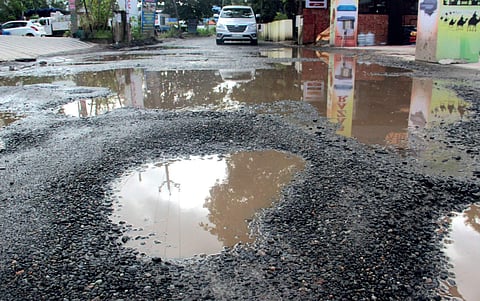

In one of the videos that went viral on social media a few weeks ago, an artist in Bengaluru was seen walking in the costume of an astronaut. He did his ‘moonwalk’ around Bengaluru’s crater-sized potholes. It isn’t Bengaluru alone that has bad roads. The western suburbs of Mumbai where I live and Andheri have some bits of road left here and there amid potholes.
The authorities are taking the umbrage of metro construction. The world over, metros are constructed in densely populated cities. Nowhere is the main artery of the city—like the western express highway of Mumbai—left to rot for years. On most days, it takes more than two-and-a-half hours for a 15-km commute during peak hours. Travelling through Andheri, one wonders whether the municipal authorities have heard about a much-hyped programme called Swachh Bharat Mission. Piles of garbage are heaped over broken pavements, while roads proudly display their water-filled craters.
In the last few months, I have been travelling to various parts of the country and it is the same situation in most cities. How difficult is it to build a proper city drainage system? How much technology does one need to make a smooth pavement. Forget the footpaths being disabled-friendly, it would need the skill of an acrobat to negotiate through the lunar terrain of such pavements in many cities for anyone. The illegally parked vehicles and encroachment by shops add to the woes. If that isn’t enough, leaning telephone posts, dangling cable TV wires and electric posts pasted all over with advertisement posters scar the cityscape.
Every monsoon brings its own woes to Indian cities. No road, it appears, has been designed to withstand even a modest shower. Plastic chokes our drainage system, causing water-logging which in turn damages the road. By the time, these roads are repaired, it would be time for the next monsoon. No wonder, after paying vehicle tax of 15 years, innumerable tolls, GST and income tax, citizens of the country feel cheated by the government. No amount of shaming on social media or otherwise seems to have any impact on the thick-skinned politicians or the corrupt bureaucrats.
Why should any politician bother when we vote based on caste, religion and xenophobia and not on any issue that concerns us? Why should any bureaucrat worry, when his position, power and pelf is safe irrespective of whichever party comes to power? Why should the contractor bother, when all he needs to do is support the politician who desperately needs funds for the increasingly expensive elections
and please the bureaucrat who is only bothered about his earnings?
India, the proud inheritor of the Indus Valley Civilisation that boasted internal plumbing and covered drainage and planned city streets, has become a laughing stock as far as its modern cities are concerned. A country that was famed for its aesthetics, that gave the magnificent Chola temples, the Taj Mahal, Ellora, Konark, Hampi, etc cannot make a half-decent pavement. Our cities look ugly. With its estuaries and mangroves, with its lush tropical greenery and a superb bay, with its backwaters and long beaches, with its heritage and culture, Mumbai should have been one of the most beautiful cities in the world. Instead, it presents a picture of squalor and neglect. Same is the case with Kolkata, Chennai, Hyderabad, Delhi, Lucknow, Kochi, Bengaluru or any other major city in India.
Travellers used to sing paeans to our ancient and medieval cities such as Agra, Delhi, Lucknow, Pataliputra, Amaravati, Kozhikode, Poompuhar, Madurai, Hampi, etc. They said no country in the world had such magnificent cities, with well-planned streets, gardens, aesthetically built markets and palaces. Can we imagine anyone saying this about any city of ours in this present era? There are a few streets that are passable in all these cities, what one can call ‘showpiece roads’, surrounded by miles of neglect and filth, all tall claims about Swachh Bharat notwithstanding.
Even in countries that are poorer than India, cities are well-planned and look pleasing to the eye. Take the case of Colombo. Maharashtra’s GDP at $430 billion is five times that of Sri Lanka at $87 billion. Yet, Colombo is miles ahead of any Indian city as far as city planning and neatness is concerned. It isn’t about money, it is about attitude. It isn’t about how old or great your civilisation was. It is about how good it is now.
There is an exception to this rule, though. Surrounded by squalor, there are islands of sleek housing complexes and mini towns in every city. These are built by private builders for the aspiring middle class. It is an example of private-sector efficiency versus the public sector apathy. Our airports used to present a picture of third world neglect before the swanky private airports came into existence. We are privatising the Railways. Why not think about privatising the entire cities, with the elected bodies becoming the asset owners? It would relieve the cities of the tyranny of petty contractors and low-level bureaucrats. With our booming cities, the private player would be able to make a profit by maintaining the city in a proper manner. It would give such corporate bodies the benefit of scale.
Drainages can be pre-cast in factories like how flyovers are being done now. Fixing of responsibility becomes easier if roads, electricity or drainage aren’t maintained well. Now, the blame gets shifted between departments and petty contractors. Traffic rules will be implemented in a better manner as fines would be a source of income for the private city managers. The government should try this model for at least the 100 smart cities identified and call for global tender, inviting international expertise in maintaining our cities. Leaving them as they are now is an insult to our country and a blot on our civilisation.
mail@asura.co.in